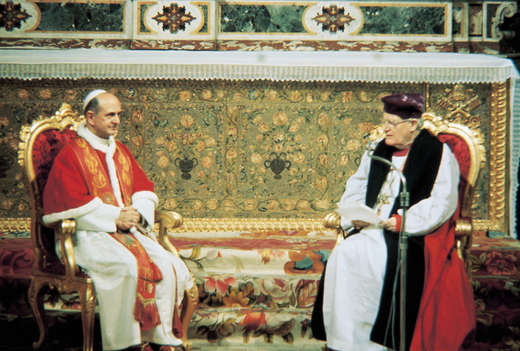Does reality matter? Is it the decisive and necessary reference point for discovering what is and what is not, what is true and what is false? Or is reality subject to revision based one’s preferences, desires, or some other factor? These questions come to mind when we consider the astounding report concerning remarks made by Cardinal Francesco Coccopalmerio on the question of the validity of Anglican orders. According to Christopher Lamb in The Tablet, Coccopalmerio characterized the Church’s teaching on the question of Anglican orders as follows: “We have had, and we still have a very rigid understanding of validity and invalidity: this is valid, and that is not valid. One should be able to say: ‘this is valid in a certain context, and that is valid another context’.”
The Cardinal speculates on the doctrinal implications of past papal gestures of friendship and respect, stating: “What does it mean when Pope Paul VI gave a chalice to the Archbishop of Canterbury? If it was to celebrate the Lord’s Supper, the Eucharist, it was meant to be done validly, no?” He continues: “This is stronger than the pectoral cross, because a chalice is used not just for drinking but for celebrating the Eucharist. With these gestures, the Catholic Church already intuits, recognizes a reality.”
These remarks are published in a new book, whose title is not given by Lamb, presenting the contents of a meeting of the Malines Conversation Group held near Rome in April of this year. Vatican Radio covered the meeting, noting the participation of Cardinal Coccopalmerio. The Vatican Radio story included comments by Fr. Tony Currer of the Pontifical Council for the Promotion of Christian Unity. Regarding Anglican orders he comments: “I think it’s true to say we don’t use the language of ‘null and void’ any more,” as that’s “clearly not what is spoken by the gestures, generosity, and warmth which we see time and time again.”
Validity is another word for reality when speaking about the sacraments. The Church teaches clearly what is necessary for the valid – that is, true and real – celebration of the sacraments. By invoking the pejorative buzzword “rigid understanding” regarding validity and invalidity, Coccopalmerio reduces the Church’s determination of what counts as a valid sacrament to the expression of a psychologically unhealthy attitude rooted in ignorance or irrational fear.

The question of validity is simple: Does the Church consider an Anglican ordination to be a valid administration of the sacrament of Holy Orders? The answer is no, as determined authoritatively by Pope Leo XIII in his encyclical Apostolicae Curae. Anglican ordination does not make a man into a Catholic priest. That determination is objective, grounded in a careful and reasoned study of the history, doctrines and practice of both the Catholic Church and the Anglican Communion.
Coccopalmerio also states: “When someone is ordained in the Anglican Church and becomes a parish priest in a community, we cannot say that nothing has happened, that everything is ‘invalid’.” The choice presented in this statement is that at an Anglican ordination either a man is validly ordained a priest, or that nothing happened. But there is a third possibility: Anglican ordination results in someone becoming an Anglican priest, not a Catholic priest.
The Church teaches that such an ordination is not a valid Catholic ordination. The man ordained in an Anglican ceremony does not receive the sacrament of Holy Orders. The sacrament of Holy Orders is not administered. (I leave aside the question of Anglicans ordained by bishops who themselves received valid episcopal consecration by Orthodox or Old Catholic bishops.)
Coccopalmerio and Currer apparently resist this truth. The Cardinal claims that the Papal gift of a chalice to the Archbishop of Canterbury means that Pope Paul VI considered the Anglican Communion Service to be a valid celebration of Mass because “it was meant to be done validly.” But Pope Paul never said what Coccopalmerio infers. A gesture does not equal a doctrinal pronouncement.
Fr. Currer claims that “we don’t use the language of ‘null and void’ anymore.” If by “we” he means the Catholic Church, he is wrong. Pope Leo XIII’s determination has never been rejected by any of his successors. The fact that Fr. Currer and others are unhappy that Anglican orders were found to be null and void is evident. Currer’s dissatisfaction with this exercise of the papal magisterium does not, however, mean that the Church no longer upholds the invalidity of Anglican orders.
Coccopalmerio seeks to dismiss the objective truth of what constitutes sacramental validity in the Catholic Church by making it changeable according to a “context.” Is this not relativism plain and simple? The Cardinal does not claim here that the criteria for determining the validity or invalidity of the administration of Holy Orders were misapplied by Leo XIII when he examined Anglican orders. (Perhaps he addresses this question elsewhere in his published remarks.) He simply says that those criteria should not apply because they are “rigid.” Pope Leo XIII’s determination that Anglican orders are invalid is maligned as rigid when one does not like the particular truth in question. One man’s rigidity is another man’s solidity. Is the Church stubborn or steadfast in this matter? I would say She is both. That is what the truth requires regardless of any context. If She made a huge mistake here, what else will be put on the chopping block?
Dietrich von Hildebrand wrote in his essay The Dethronement of Truth: “Disrespect for truth – when not merely a theoretical thesis, but a lived attitude – patently destroys all morality, even all reasonability and all community life. All objective norms are dissolved by this attitude of indifference toward truth; so also is the possibility of resolving any discussion or controversy objectively. Peace among individuals or nations and all trust in other persons are impossible as well. The very basis of a really human life is subverted.”
Truth is cast aside at our great peril.















